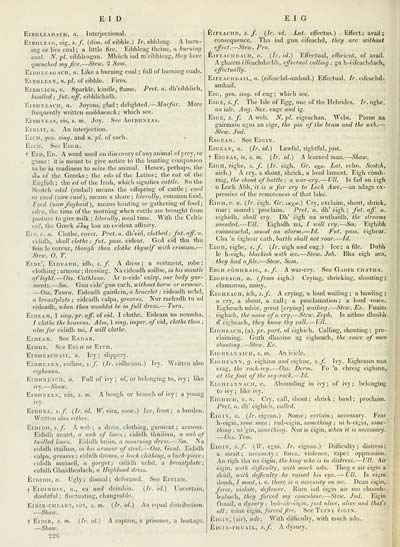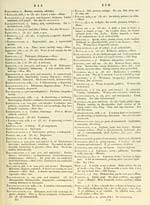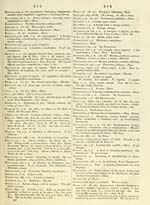Download files
Complete book:
Individual page:
Thumbnail gallery: Grid view | List view

E I D
EiBHLEADACii, n. liiterjectional.
EiBiiLEAO, eig, s. /. (dim. of eibhle.) Ir. ebhleog. A burn-
ing or live coal ; a little fire. Eiblileag theine, o burning
coal. A', pi. ciblilcagan. Mlu'ich iad m'cibhleag, tkf^if have
<iuenched my Jire. — Stew. 2 Sam.
EiiiiiLKAGACii, a. Like a bvirning coal ; full of burning coals.
Einn LEAN, n.pZ. of eibhle. Fires.
EiBULicii, r. Sparkle, kindle, flame. Pre<. o. dh'eibhlich,
kindled; fat. off. eibhlichidh.
EiBiiNEACii, a. Joyous, glad ; deliglited.—il/a(/«r. More
frequently written aoibhneach ; which see.
EiBHNEAS, eis, s. m. Joy. See Aoibiineas.
EiuLiT, s. An interjection.
Eicii, gen. sing, and n. pi. of each.
fticii. See EiGii.
t Bid, Ed. A word used on discovery of any animal of prey, or
game: it is meant to give notice to the luuUing companion
to be in readiness to seize the animal. Hence, perhaps, the
%iii of the Greeks ; the edo of the Latins ; the eat of the
En^^lish ; the ed of the Irish, which signifies cattle. So the
Scotch edal (eudail) means the offspring of cattle ; coed
or cued (now cuid), means a share ; literally, common food.
Focd (now fag haid), means hunting or gathering of food;
edra, tlie time of the morning when cattle are brought from
pasture to give milk ; literally, meal time. With the Celtic
eid, the Greek ddx^ has an evident affinity.
Ei I), V. a. Clothe, cover. Pret. a. dh'eid, clothed ; fit. aff. a.
oididh, shall clothe ; fit. pass, eidear. Ged eid thu thu
fein le corcur, though thou clothe thyself with crimson. —
Stew. 0. T.
Eide', EiDF.Anii, idh, s. f A dress; a vestment, robe;
clothing; armour; dressing. Naeidcadh soillse, in his mantle
of light. — Oss. Cathluno. Ar n-eide' cuirp, our body gar-
ments. — Sm. Gun eide' gun each, without horse or armour.
— Oss. Taura. Eideadh gairdein,^ bracelet ; eideadh uchd,
« breastplate; eideadh calpa, greaves. Nur rachadh tu ad
eideadh, when thou wouldst be in full dress. — Turn.
EiDEAM, 1 sing. pr. aff. of eid. I clothe. Eideam na neamha,
/ clothe the heavens. Also, 1 sing, imper. of eid, clothe thou ;
also for eididh mi, / will clothe.
EiDEAii. See Eadar.
EiDiiE. See EiGii or Enii.
EiDiiEACiiAiL, a. Icy; slippery.
EiniiEAXX, eidhne, s./. (/)•. eidhcauu.) Ivy. Written also
eigheann.
EiDiiXEACii, a. Full of ivy ; of, or belonging to, ivy ; like
ivy. — Shaw.
EiDiiNEAS, ein, s. m. A bough or branch of ivy ; a young
ivy.
EiDnUE, s./. (Ir.id. W. c'lvi., SÌMW.) Ice, frost; a burden.
Written also cithre.
EiDinii, s.y. A web; a dress, clothing, garment ; armour.
Eididh anairt, a web of linen; eididh thùiliuu, a web of
twilled linen. Eididli bròin, a tnourning dress. — .SV«. Na
eididh stailinn, in his urmour of steel. — Oss. Gaul. Eididh
calpa, greaves ; eididh droma, a back clothing, a back-piece ;
eididh muineil, a gorget; eididh uchd, u breastplate;
eididh Ghaidhealach, a Highland dress.
Eididh, a. Ugly; dismal; deformed. Sec ErriDii.
•(■ Ei DIM 11 IN, a., ea and deimhin. (/;-. id.) Uncertain,
doubtful ; fluctuating, changeable.
EiDiu-iiii.Aiir, eiit, s. m. (Ir.id.) An npial <llstnbiition.
— Shaw.
-f EiKiu, s. m. (Ir. id.) A captive, a prisoner, a hostage.
— Shaw.
226
E I G
EiFEACiiD, s. f. (Ir. id. Lat. effcctus.) Eft'cct; avail;
consequence. Tha iad gun eifeachd, they are without
effect. — Stew. Pro.
EiFEACiiDACii, a. (Ir. id.) EfTectual, efficient, of avail.
A ghairm eifeachdachh, effectual calling ; gu h-eifeachdach,
effectually.
EiFEACiiDAiL, a. (eifearhd-amhuil.) Effectual. Ir. eifeachd-
anihail.
EiG, gen. sing, of eug ; which see.
EiGE, s.f The Isle of Egg, one of the Hebrides. Ir. oghe,
an isle. Aug. Sax. cage and ig.
EiGE, s.f. A web. N. pi. eigeachan. Webs. Pinne na
gairmain agus an eige, the pin of the beam and the web. —
Stexu. Jud.
EiGEAN. See EiGiK.
EiGEAN", a. (Ir.id.) Lawful, rightful, just.
t EiGEAS, is, s. 7n. (Ir. id.) A learned man. — Shaw.
EiGii, eighe, s. f (Ir. eigh. Gr. h^yi. Lat. echo. Scotch,
aich.) A cry, a shout, shriek, a loud lament. Eigh còmh-
raiii, the shout of battle; a war-cry. — Ull. Is fad an eigh
o Loch Abh, it is a far cry to Loch Awe, — an adage ex-
pressive of the remoteness of that lake.
ÈiGii,t). n. (Ir. eigh. Gr. tct-^a.) Cry, exclaim, shout, shriek,
roar ; sound ; proclaim. Pret. a. dh' eigh ; fit. aff. a.
eighidh, shall cry. Dh' eigh na sruthaidh, the streams
sounded. — Ull. Eighidh mi, / ivill cry. — Sin. Eighibh
caismeachd, sound an alarm. — Id. Put. pass, eighear.
Cha 'n eighear cath, battle shall not roar. — Id.
EiGii, eighe, s.f. (/;•. aigh and eag.) Ice; a file. Dubh
le h-eigh, blackish with ice. — Steiv. Job. Bha eigh aca,
they had afle. — Stew. Sam.
EiGii cÒMiiiiAKi, s. y. A war-cry. See Gaoiu chatiia.
EiGiiEACii, a. (from eigh.) Crying, shrieking, shouting;
clamorous, noisy.
ÈiGiiEACH, ich, s.f. A crying, a loud wailing; a bawling;
a cry, a shout, a call ; a proclamation ; a loud voice.
Eigheach mhòr, great [crying] wailing. — Stew. Ex. Fuaim
■ eighich, the noise of a cry. — Stew. Zcph. Is aithne dhoibh
d' eigheach, they know thy call. — Ull.
EiG n EACH, (a), pr. p«r<. of eighich. Calling, shouting; pro-
claiming. Guth dhaoine ag eigheach, the voice of men
shouting. — Stew. Ex.
EiGiiEANAicii, s. VÌ. An icicle.
EiGiiEANX, jf. eighinn anti eighne, s.f. Ivj'. Eigheann nan
crag, the rock-ivy. — Oss. Derm. Fo 'n chreig eighinn,
at the foot of the ivy-rock. — Id.
EiGiiEANNACii, a. Abounding in ivy; of ivy; belonging
to ivy ; like ivy.
Ek; men, I'. 71. Cry, call, shout ; shriek; bawl; [)roclaim.
Pret. a. dh' eighich, called.
ÈiGiN, a. (/r. eigcan.) Some; certain; necessary- Fear
h-eigin, some man; rud-cigin, something ; ni h-eigin, some-
thing ; ni 'gin, something. Nur is eigin, when it is necessary.
— Oss. Tern.
Èu;ix, s.f (W. egni. Ir. eigean.) Difficulty; distress;
a strait; necessity; force, violence, rape; oppression.
An righ iha na cigiii, the king who is in distress. — Ull. Air
eigiii, with difficulty, with much ado. Thog e air eigin a
shùil, with difficulty he raised his eye. — Ull. Is eigiii
domh, / must, i. e. there is a necessity on me. Dean eigin,
force, violate, dejloiver. Rinn iad eigin air mo choimh-
Icabach, they forced my concubine. — Stem. Jud. Eigin
fliuail, a dysury ; beò-air-èigin, jhì< alive, alac and that's
all; teiiic eigin, /orcct/yur. See Teine i;iGiN.
ifciGiN, (air), adv. With difficulty, with much ado.
ÈiGiN-niUAiL, s.f. A dysury.
EiBHLEADACii, n. liiterjectional.
EiBiiLEAO, eig, s. /. (dim. of eibhle.) Ir. ebhleog. A burn-
ing or live coal ; a little fire. Eiblileag theine, o burning
coal. A', pi. ciblilcagan. Mlu'ich iad m'cibhleag, tkf^if have
<iuenched my Jire. — Stew. 2 Sam.
EiiiiiLKAGACii, a. Like a bvirning coal ; full of burning coals.
Einn LEAN, n.pZ. of eibhle. Fires.
EiBULicii, r. Sparkle, kindle, flame. Pre<. o. dh'eibhlich,
kindled; fat. off. eibhlichidh.
EiBiiNEACii, a. Joyous, glad ; deliglited.—il/a(/«r. More
frequently written aoibhneach ; which see.
EiBHNEAS, eis, s. m. Joy. See Aoibiineas.
EiuLiT, s. An interjection.
Eicii, gen. sing, and n. pi. of each.
fticii. See EiGii.
t Bid, Ed. A word used on discovery of any animal of prey, or
game: it is meant to give notice to the luuUing companion
to be in readiness to seize the animal. Hence, perhaps, the
%iii of the Greeks ; the edo of the Latins ; the eat of the
En^^lish ; the ed of the Irish, which signifies cattle. So the
Scotch edal (eudail) means the offspring of cattle ; coed
or cued (now cuid), means a share ; literally, common food.
Focd (now fag haid), means hunting or gathering of food;
edra, tlie time of the morning when cattle are brought from
pasture to give milk ; literally, meal time. With the Celtic
eid, the Greek ddx^ has an evident affinity.
Ei I), V. a. Clothe, cover. Pret. a. dh'eid, clothed ; fit. aff. a.
oididh, shall clothe ; fit. pass, eidear. Ged eid thu thu
fein le corcur, though thou clothe thyself with crimson. —
Stew. 0. T.
Eide', EiDF.Anii, idh, s. f A dress; a vestment, robe;
clothing; armour; dressing. Naeidcadh soillse, in his mantle
of light. — Oss. Cathluno. Ar n-eide' cuirp, our body gar-
ments. — Sm. Gun eide' gun each, without horse or armour.
— Oss. Taura. Eideadh gairdein,^ bracelet ; eideadh uchd,
« breastplate; eideadh calpa, greaves. Nur rachadh tu ad
eideadh, when thou wouldst be in full dress. — Turn.
EiDEAM, 1 sing. pr. aff. of eid. I clothe. Eideam na neamha,
/ clothe the heavens. Also, 1 sing, imper. of eid, clothe thou ;
also for eididh mi, / will clothe.
EiDEAii. See Eadar.
EiDiiE. See EiGii or Enii.
EiDiiEACiiAiL, a. Icy; slippery.
EiniiEAXX, eidhne, s./. (/)•. eidhcauu.) Ivy. Written also
eigheann.
EiDiiXEACii, a. Full of ivy ; of, or belonging to, ivy ; like
ivy. — Shaw.
EiDiiNEAS, ein, s. m. A bough or branch of ivy ; a young
ivy.
EiDnUE, s./. (Ir.id. W. c'lvi., SÌMW.) Ice, frost; a burden.
Written also cithre.
EiDinii, s.y. A web; a dress, clothing, garment ; armour.
Eididh anairt, a web of linen; eididh thùiliuu, a web of
twilled linen. Eididli bròin, a tnourning dress. — .SV«. Na
eididh stailinn, in his urmour of steel. — Oss. Gaul. Eididh
calpa, greaves ; eididh droma, a back clothing, a back-piece ;
eididh muineil, a gorget; eididh uchd, u breastplate;
eididh Ghaidhealach, a Highland dress.
Eididh, a. Ugly; dismal; deformed. Sec ErriDii.
•(■ Ei DIM 11 IN, a., ea and deimhin. (/;-. id.) Uncertain,
doubtful ; fluctuating, changeable.
EiDiu-iiii.Aiir, eiit, s. m. (Ir.id.) An npial <llstnbiition.
— Shaw.
-f EiKiu, s. m. (Ir. id.) A captive, a prisoner, a hostage.
— Shaw.
226
E I G
EiFEACiiD, s. f. (Ir. id. Lat. effcctus.) Eft'cct; avail;
consequence. Tha iad gun eifeachd, they are without
effect. — Stew. Pro.
EiFEACiiDACii, a. (Ir. id.) EfTectual, efficient, of avail.
A ghairm eifeachdachh, effectual calling ; gu h-eifeachdach,
effectually.
EiFEACiiDAiL, a. (eifearhd-amhuil.) Effectual. Ir. eifeachd-
anihail.
EiG, gen. sing, of eug ; which see.
EiGE, s.f The Isle of Egg, one of the Hebrides. Ir. oghe,
an isle. Aug. Sax. cage and ig.
EiGE, s.f. A web. N. pi. eigeachan. Webs. Pinne na
gairmain agus an eige, the pin of the beam and the web. —
Stexu. Jud.
EiGEAN. See EiGiK.
EiGEAN", a. (Ir.id.) Lawful, rightful, just.
t EiGEAS, is, s. 7n. (Ir. id.) A learned man. — Shaw.
EiGii, eighe, s. f (Ir. eigh. Gr. h^yi. Lat. echo. Scotch,
aich.) A cry, a shout, shriek, a loud lament. Eigh còmh-
raiii, the shout of battle; a war-cry. — Ull. Is fad an eigh
o Loch Abh, it is a far cry to Loch Awe, — an adage ex-
pressive of the remoteness of that lake.
ÈiGii,t). n. (Ir. eigh. Gr. tct-^a.) Cry, exclaim, shout, shriek,
roar ; sound ; proclaim. Pret. a. dh' eigh ; fit. aff. a.
eighidh, shall cry. Dh' eigh na sruthaidh, the streams
sounded. — Ull. Eighidh mi, / ivill cry. — Sin. Eighibh
caismeachd, sound an alarm. — Id. Put. pass, eighear.
Cha 'n eighear cath, battle shall not roar. — Id.
EiGii, eighe, s.f. (/;•. aigh and eag.) Ice; a file. Dubh
le h-eigh, blackish with ice. — Steiv. Job. Bha eigh aca,
they had afle. — Stew. Sam.
EiGii cÒMiiiiAKi, s. y. A war-cry. See Gaoiu chatiia.
EiGiiEACii, a. (from eigh.) Crying, shrieking, shouting;
clamorous, noisy.
ÈiGiiEACH, ich, s.f. A crying, a loud wailing; a bawling;
a cry, a shout, a call ; a proclamation ; a loud voice.
Eigheach mhòr, great [crying] wailing. — Stew. Ex. Fuaim
■ eighich, the noise of a cry. — Stew. Zcph. Is aithne dhoibh
d' eigheach, they know thy call. — Ull.
EiG n EACH, (a), pr. p«r<. of eighich. Calling, shouting; pro-
claiming. Guth dhaoine ag eigheach, the voice of men
shouting. — Stew. Ex.
EiGiiEANAicii, s. VÌ. An icicle.
EiGiiEANX, jf. eighinn anti eighne, s.f. Ivj'. Eigheann nan
crag, the rock-ivy. — Oss. Derm. Fo 'n chreig eighinn,
at the foot of the ivy-rock. — Id.
EiGiiEANNACii, a. Abounding in ivy; of ivy; belonging
to ivy ; like ivy.
Ek; men, I'. 71. Cry, call, shout ; shriek; bawl; [)roclaim.
Pret. a. dh' eighich, called.
ÈiGiN, a. (/r. eigcan.) Some; certain; necessary- Fear
h-eigin, some man; rud-cigin, something ; ni h-eigin, some-
thing ; ni 'gin, something. Nur is eigin, when it is necessary.
— Oss. Tern.
Èu;ix, s.f (W. egni. Ir. eigean.) Difficulty; distress;
a strait; necessity; force, violence, rape; oppression.
An righ iha na cigiii, the king who is in distress. — Ull. Air
eigiii, with difficulty, with much ado. Thog e air eigin a
shùil, with difficulty he raised his eye. — Ull. Is eigiii
domh, / must, i. e. there is a necessity on me. Dean eigin,
force, violate, dejloiver. Rinn iad eigin air mo choimh-
Icabach, they forced my concubine. — Stem. Jud. Eigin
fliuail, a dysury ; beò-air-èigin, jhì< alive, alac and that's
all; teiiic eigin, /orcct/yur. See Teine i;iGiN.
ifciGiN, (air), adv. With difficulty, with much ado.
ÈiGiN-niUAiL, s.f. A dysury.
Set display mode to: Large image | Transcription
Images and transcriptions on this page, including medium image downloads, may be used under the Creative Commons Attribution 4.0 International Licence unless otherwise stated. ![]()
| Early Gaelic Book Collections > J. F. Campbell Collection > Gaelic dictionary, in two parts > (316) |
|---|
| Permanent URL | https://digital.nls.uk/79301866 |
|---|
| Description | Volumes from a collection of 610 books rich in Highland folklore, Ossianic literature and other Celtic subjects. Many of the books annotated by John Francis Campbell of Islay, who assembled the collection. |
|---|
| Description | Selected items from five 'Special and Named Printed Collections'. Includes books in Gaelic and other Celtic languages, works about the Gaels, their languages, literature, culture and history. |
|---|

